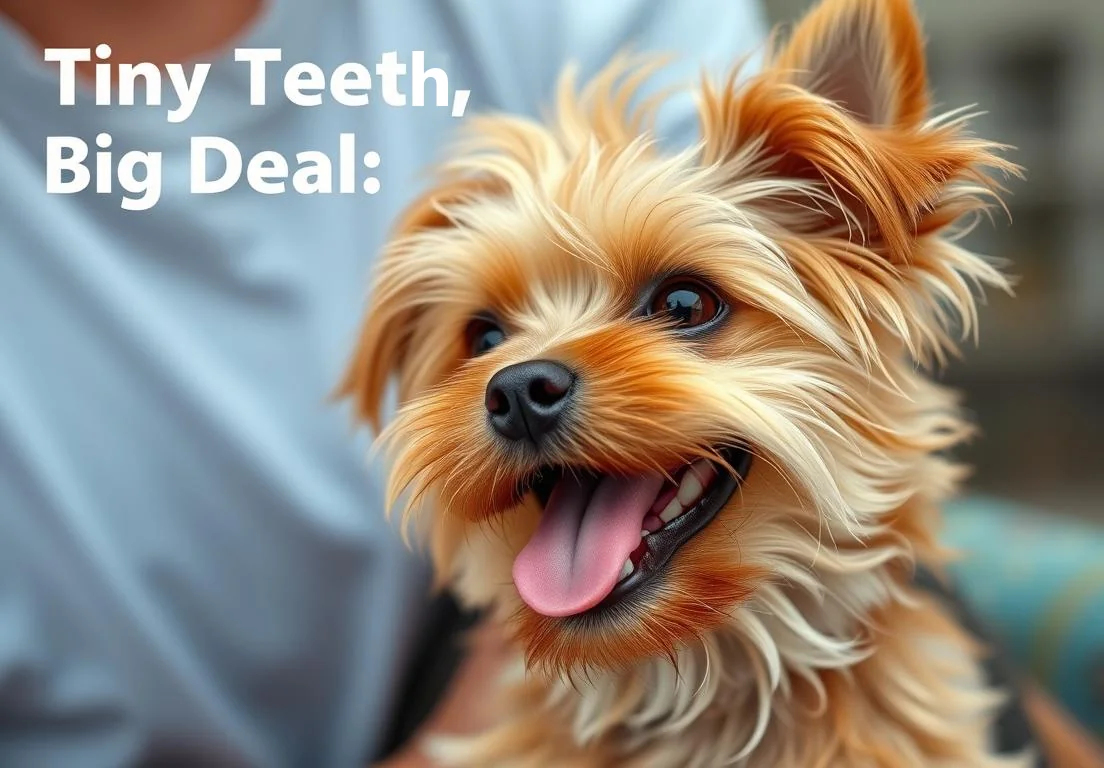Disclosure: We may earn a commission from helpful, relevant links in our content. No cost to you. See our privacy policy.
Yorkies may be small in size, but their dental health is a huge concern. Those tiny teeth can lead to big problems if not properly cared for.
Maintaining dental hygiene is crucial to keeping your Yorkie happy and healthy. Regular brushing, dental check-ups, and specific chew toys can make all the difference in preventing dental disease. You’ll want to stick around because there are some insider tips and fun facts about Yorkie dental care that could change the way you think about your furry friend’s oral health.

Why is Dental Health Important for Yorkies
Dental health isn’t just a nice-to-have for Yorkies; it’s critical for their overall well-being. Yorkies are particularly prone to dental issues due to their small mouths and densely packed teeth. This crowding can lead to periodontal disease, a serious condition that can cause pain, tooth loss, and even impact vital organs if bacteria from the mouth enter the bloodstream.
Regular dental care is essential not just for preventing bad breath and keeping those tiny teeth shiny; it also plays a huge role in prolonging your Yorkie’s life. Regular cleanings help to remove plaque and tartar before they turn into bigger problems. Missing out on this can lead to infections that are both painful and expensive to treat. A proactive approach to dental health means happier days for your furry friend, and fewer vet bills for you.
Common Dental Issues in Yorkies
Yorkies can experience a range of dental issues, but some of the most common include periodontal disease, tooth decay, and tartar buildup.
- Periodontal Disease: This is the most frequently diagnosed dental issue in Yorkies. It begins with plaque buildup leading to inflammation of the gums, which can progress to more severe forms, jeopardizing not just oral health but overall health.
-
Tooth Decay : Just like humans, Yorkies can suffer from cavities. Their diet plays a significant role here; sugary or high-carb foods can contribute to tooth decay. Regular check-ups can help catch these problems early.
-
Tartar Buildup : If plaque isn’t brushed away, it hardens into tartar, which creates an ideal environment for bacteria. If not addressed, tartar can lead to gingivitis and, subsequently, periodontal disease.
It’s worth noting that Yorkies often show signs of discomfort only when conditions worsen, which is why regular veterinary dental check-ups are so crucial. Maintaining a consistent dental routine at home, including brushing, dental treats, and chew toys, can significantly reduce the risk of these issues. Keep a close eye out for symptoms like bad breath, excessive drooling, or difficulty eating, as they may indicate underlying dental problems.
How Often Should You Brush Your Yorkie’s Teeth?
Daily brushing is the gold standard for Yorkie dental health—after all, those tiny teeth can harbor a lot of plaque and tartar if they aren’t cared for.
Aim for at least three times a week if daily brushing seems a bit much at first.
It’s all about creating a routine that fits both you and your Yorkie’s lifestyle.
To introduce tooth brushing, start slow. Let your pup sniff and taste the toothbrush before attempting to brush. This familiarization can make them more comfortable. Choosing a time when your Yorkie is calm, perhaps after a walk or playtime, can also help. Use gentle strokes, focusing on the outer surfaces of the teeth and gums. And remember, patience is key—don’t rush it or force it. Gradually build up to longer brushing sessions for the best results.
Best Toothpaste and Brushes for Yorkies
Choosing the right dental products is vital for maintaining your Yorkie’s oral health. Pet-specific toothpaste is a must since human toothpaste can be toxic to dogs. Look for flavors your Yorkie enjoys, like chicken or peanut butter, to make the experience more pleasant. Some good options include Vet’s Best Enzymatic Dog Toothpaste and PetSmile Professional Dog Toothpaste.
For toothbrushes, opt for those designed for small breeds. A finger brush, like the Jasper Dog Toothbrush, gives you control and can feel less intimidating than a traditional brush. Alternatively, a small-bristled dog toothbrush, like the Nylabone Advanced Oral Care Dog Toothbrush, can also work well.
Consider these important points:
- Use pet-safe products only.
- Look for enzyme-based toothpaste, which can help break down plaque.
- Explore interactive brushes, which can make brushing feel less like a chore.
Focusing on quality products will make the brushing process smoother and more effective, helping to keep those tiny teeth in tip-top shape!
Dental Chews: Do They Really Help?
Dental chews can make a big impact on your Yorkie’s oral health. These treats aren’t just tasty; they often help reduce plaque and tartar buildup, which are the main culprits behind gum disease and bad breath. The chewing action helps scrub the teeth, while many of these chews contain ingredients designed to promote healthier gums and fresher breath.
Look for chews that are specifically formulated for small breeds; you’ll want soft yet sturdy options that match your Yorkie’s tiny teeth.
Natural ingredients like chicken or beef can be appealing, but go for chews that also incorporate dental-specific components, like baking soda or enzymes, that aid in cleaning teeth. Brands such as Greenies, Virbac C.E.T. Enzymatic, or Nylabone offer excellent choices tailored for small dogs.
It’s also worth keeping an eye on portion sizes to ensure your Yorkie doesn’t overindulge. Too many dental chews can lead to weight gain, which brings its own set of health issues. So, use these treats as part of an overall dental strategy rather than the sole solution.
Regular Vet Check-Ups
Prioritizing regular veterinary dental check-ups is crucial for your Yorkie’s long-term health. These visits not only allow for professional cleanings but also give your vet a chance to spot potential issues before they escalate.
During a dental check-up, you can expect the vet to inspect your pup’s mouth, gums, and teeth thoroughly. They’ll look for any signs of gingivitis, periodontal disease, or loose teeth, and might recommend a professional cleaning if needed.
You might also get advice on home care practices that fit your Yorkie’s lifestyle, like the best toothbrush techniques or dietary tips for maintaining good dental health.
In general, you should aim for annual dental check-ups, but if your Yorkie has existing dental issues or is more senior, your vet might suggest more frequent visits.
Keeping up with these appointments not only helps maintain your dog’s dental health but also contributes to their overall well-being.
Signs of Dental Problems to Watch For
Bad breath isn’t just a nuisance; it can be a glaring sign that your Yorkie might be struggling with dental issues. If your pup’s breath smells something fierce, it could indicate plaque build-up, gum disease, or tooth decay.
Watch out for difficulty eating; if your usually enthusiastic eater is suddenly dainty at mealtime, something’s likely off. A Yorkie may avoid their food or chew carefully if they’re in pain.
Keep an eye on those pearly whites for swollen or bleeding gums. If you see redness, swelling, or any dark spots, it’s not just cosmetic – your dog may be experiencing discomfort or infection.
Excessive drooling can also point to dental troubles. If your pup’s drool game is on overdrive and it’s a new thing, consider scheduling a vet check.
Lastly, be alert to any changes in behavior. If they’re more irritable or less playful, it might stem from unseen dental pain.
Fun Facts About Yorkies and Their Teeth
Yorkies may be tiny, but their dental health is a big deal. Did you know that they have a tendency to suffer from tooth decay more than many other breeds? Given their small mouths and, often, overcrowded teeth, it’s vital to stay on top of their oral hygiene.
Interestingly, Yorkies typically have an undershot jaw, meaning their bottom teeth tend to protrude beyond their top teeth.
This unique dental structure creates a perfect storm for plaque and tartar to accumulate, necessitating regular vet check-ups.
A fun tidbit to remember: Yorkies have about 42 teeth! That’s a whole lot of chompers in a small mouth.
Their dental structure includes incisors, canines, premolars, and molars, with specific roles for each type of tooth. Typically, they are born without teeth and develop a set of 28 deciduous (baby) teeth before the permanent teeth emerge between 4 and 8 months of age. Regular dental care is crucial to prevent common issues such as tooth decay and gum disease, especially considering their small mouths, which can lead to overcrowding and dental problems.
Their baby teeth come in around three weeks, and they start losing them by six months.
Maintaining their dental health helps you avoid costly vet bills and keeps your furry friend happy. Regular cleanings, chew toys designed for dental health, and a solid brushing routine can work wonders, so make it part of your routine. You’ll not only be giving your Yorkie a fresh mouth but also a happier, healthier life.
Hidden Secrets to Keeping Your Yorkie’s Teeth Healthy
Your Yorkie’s dental health is crucial, and keeping those tiny teeth in tip-top shape doesn’t have to be a chore. Here’s a few less-known tricks that can boost your pup’s dental hygiene.
Regular Use of Coconut Oil works wonders. Not only does it help fight bad breath, but its antibacterial properties can aid in preventing plaque buildup. Dab a small bit on your finger and gently rub it on your Yorkie’s teeth. They’ll love the taste, and you’ll love the results.
Introduce Crunchy Veggies —carrots, celery, or sweet potatoes—into your dog’s diet. These crunchy snacks can help scrub away plaque as they chew. Plus, they’re a healthier alternative to many commercial treats that can be filled with sugars.
Dental Chews with Probiotics are an excellent choice. Look for chews specifically designed to promote oral health. They can be a fun way for your Yorkie to keep their teeth clean while also supporting good gut health.
Use of Water Additives is an unconventional but effective option. These additives are designed to be mixed in with your Yorkie’s water and can help reduce bacteria in the mouth, promoting fresher breath and healthier gums.
Rotate Dental Toys to keep your Yorkie interested. Most pups get bored quickly, so having a few different options will ensure they’re consistently engaging in activities that promote dental health. Look for toys that are specifically designed to reach the back teeth, where plaque often hides.
One often-overlooked aspect is Regular Veterinary Dental Cleanings. While you can do a lot at home, professional cleanings can tackle plaque and tartar that brushing at home misses. Make this a part of your Yorkie’s routine healthcare plan, typically annually or semi-annually, based on their dental condition.
Taking proactive steps now can pave the way for a long, healthy life for your furry friend. Be consistent with these practices, and you’ll likely notice that your Yorkie has healthier, happier teeth to show off!
Alex, a passionate animal lover, has experience in training and understanding animal behavior. As a proud pet parent to two dogs and three cats, he founded AnimalReport.net to share insights from animal experts and expand his knowledge of the animal kingdom.




